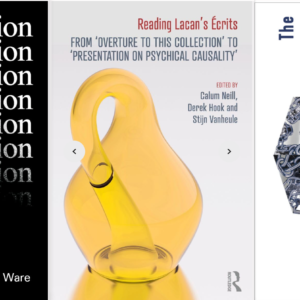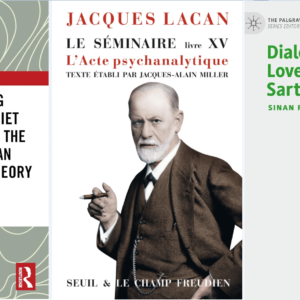News – April 2015
Announced last month for publication in September is the ‘official’ English translation of Lacan’s Seminar VIII, on transference, under the direction of Jacques-Alain Miller. This Seminar, presented between 1960 and 1961, is especially interesting for the fact that instead of commentating on the already voluminous contributions made by post-Freudian analysts on the transference (and counter-transference) which were available by that tiime, Lacan chose instead to focus on Plato’s text The Symposium to approach the topic. Lacan’s comments on this text look in particular at Alcibiades’ speech to the guests at the banquet, which put Socrates in the place of love and identify in him a mysterious ‘agalma’ which makes Alcibiades attracted to Socrates. This is a position that Socrates refuses, however, and he instead takes the Lacanian approach of sending Alcibiades’ message back to him in inverted form by highlighting that his true object of desire is Agathon. This new edition of Seminar VIII is part of an acceleration of the translation of Lacan’s work into an authorised collection, and is translated from the French by Bruce Fink.
Relatedly, and perhaps as a prelude to the publication of Seminar VIII, the Affiliated Psychoanalytic Workgroups announced last month that it will look at the theme of transference in its thirteenth annual conference taking place in Ghent, Belgium on 21st-23rd August. Keynote speakers will be Kazushige Shingu and Paul Verhaeghe. Full details on the flyer here.
Back in 1997 Rebus Press published The Klein-Lacan Dialogues, a collection of papers by key thinkers from the two schools’ perspectives on subjects including phantasy, transference, and interpretation. Now, following from a conference on the same theme held in 2011, Karnac has announced for October this year the publication of The New Klein-Lacan Dialogues. The new edition features contributions by prominent Lacanians such as Bernard Burgoyne (editor of the original volume) and Kleinians such as Robert Hinshelwood. Pre-order from the publishers here.
The publication of volume 29 of Psychoanalytic Notebooks, the journal of the London Society of the New Lacanian School, was announced in April. On the theme of sexual orientation – pertinent in the context of the involvement of leading Lacanians in debates over the legalisation of gay marriage, especially in France – it includes contributions from Jacques-Alain Miller, Pierre Naveau, and Hervé Castanet. Order here.
The Letter, the Irish Journal for Lacanian Psychoanalysis, updated its site last month to provide links to download the publication’s previous papers. Its news section also contains updates on forthcoming talks in Dublin from the Irish School of Lacanian Psychoanalysis and the International Lacanian Association (ALI).
The SITE for Contemporary Psychoanalysis, which trains practitioners in the Lacanian orientation as well as others, published the latest edition of its own journal, Sitegeist, in April. Edited by Dorothée Bonnigal-Katz it is available for order here.
For French speakers seeking a transcript of Lacan’s Seminar VII on the Ethics of Psychoanalysis, Patrick Valas has very helpfully updated his site in April to provide a new transcription of the Seminar here.
Jacques Lacan: Between Psychoanalysis and Politics, a new volume edited by Samo Tomsic and Andreja Zevnik, was announced for release in August. It looks at the contribution Lacan’s work could make to international politics and includes contributions from internationally recognised scholars in the field.
Finally in terms of new publications, as heralded in last month’s news post, Lacanian Ink 45, on the ‘wicked Other’, was released in April as is now available to buy on Amazon. Subscribe on Lacan.com to receive the new editions (two a year) as they come out.
In terms of events, the Centre for Freudian Analysis and Research – CFAR – in London announced the timetable of its public seminars for the summer term of 2015 last month. Starting on the 25th April, a particular focus for this term is ‘How Lacan Practiced’. This is a topic which has been covered extensively on this site before (see for example here, here, here, here, and here), by drawing on the testimonies of Lacan’s analysands and others close to him, which have been collected by figures such as Alain Didier-Weill and Jean Allouch (the latter in his wonderful collection Allo Lacan? – Certainment Pas.) Other talks in CFAR’s schedule include two by Paul Verhaeghe on madness and identity in a time of loneliness. See the full schedule here.
Radio Lacan continues to publish English content in the form of podcasts. Uploaded in the last month were a report on Marie-Hélène Brousse’s Seminar in New York in April by María Cristina Aguirre (where Brousse comments on the ‘religious freedoms’ act in the US last month and the terrorist attacks in Paris in January); ‘The Death Drive Unhinged, or Besson’s Dream of Annihilating Life’ by Natalie Wülfing; Getting out of feeblemindedness by Despina Andropoulou; and Geert Hoornaert’s contribution to the recent seminar on the Parlêtre” organised by GIEP-NLS, the Israeli Society of the NLS.
Video of Prof Aron Dunlop’s lecture, ‘Living in the Age of Anxiety: Jacques Lacan in Dialogue with Paul Tillich and Hannah Arendt’ was uploaded to YouTube in April. Dunlop looks at Lacan’s tenth seminar, from 1962-63, in relation to recent Tom Cruise movies and Bill Murray’s Groundhog Day from 1993, and the concepts of repetition and the death drive.
Those living or working in New York City can find details about the upcoming events of the two groups of the Lacanian orientation there – the New York Freud and Lacan Analytic Group, and the Jacques Lacan Workshop – on the Lacanian Compass site here.
In an article which should be of interest to Lacanians, The New York Times published a piece in April critical of the ‘mindfulness’ movement, warning against its rapid rise as a current in the psy- field. Virginia Heffernan traces the origins of the movement from Buddhist-inflected techniques (later scrubbed of their religious meaning); through to its links with fashionable strategies for achieving personal success such as positive thinking, the recovery approach, and self-help; and to the work of Jon Kabat-Zinn in popularising ‘mindfulness’ in its use in business and the commercial sphere. Of the latter as an indication of the aims of mindfulness Heffernan especially counsels scepticism, and we might see parallels with the way that Lacan criticised the approach of the ego’s psychologists in the 1950s, or current Lacanians today criticise CBT – in each case the critique is directed against a conformist model of ‘adaptation’ and the supposed establishment of a ‘conflict-free’ sphere in human life. Heffernan concludes by arguing from a perspective that Lacanians will be sympathetic to – that “suffering cannot be escaped but must be faced”. A short article well worth reading.
Finally, yours truly will be giving two talks in Cyprus in early May at Cyprus Society of the School of the Freudian Letter. ‘From a Tickle to an Inferno – The Theory of Jouissance in Psychoanalysis’ and ‘The Fruit and the Flame – What did Lacan say about Love?’ will then be written up as articles on this site in the near future. Stay tuned.
Got news? Get in touch.




Leave a Reply